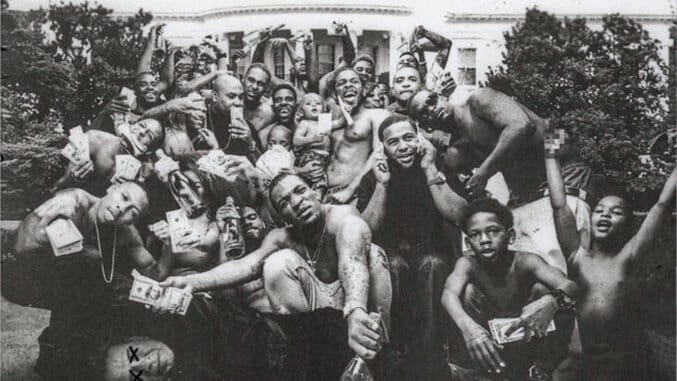7 Modern Protest Songs by People of Color

Protest music has been the heartbeat of social and political movements throughout the world. In the darkest and most bewildering hours of our country’s history, it’s given the forgotten a voice, and reminded the powers that be to pay attention to constituents. Now, as our country wades in uncertainty, subversive anthems are more important—and more beautiful—than ever.
When most people think of protest music in the United States they think of the 1960s—a decade often punctuated by hippies and white dudes with guitars. Not to detract from the great folk artists like Woody Guthrie or Bob Dylan who defined that era—but with persistent, ever-increasing racism and xenophobia, it’s important to elevate the voices of those too-often silenced. Now, more than ever, their stories are the ones we should be singing along with and sharing, so here are seven modern protest songs by people of color you need to hear.
1. YG & Nipsey Hussle, “Fuck Donald Trump”
The title speaks for itself here. Enraged by the nomination of Donald Trump, YG and Nipsey Hussle released this song with an accompanying video in April 2016. The West Hollywood video shoot—which features an anti-Trump rally of predominantly black and Latino protestors lead by YG and Nipsey Hussle—was shut down by police with “tasers, then pistols, then SHOTGUNS,” according to Nipsey Hussle’s collaborator, Mosaicc.
The video begins with these words, “Our opinion is that in the age of a technologically empowered an nuclear armed planet…separation is the enemy,” a comment both on the pervasive racism throughout the history of the United States, as well as Donald Trump’s divisive, xenophobic rhetoric. They attack his proposed plan to build a wall along the Mexican border specifically with clips from a Trump speech. The verse that hits hardest is this one, “Hold up, Nip, tell the world how you fuck with Mexicans / It wouldn’t be the USA without Mexicans / And if it’s time to team up, shit, let’s begin / Black love, brown pride in the sets again / White people feel the same as my next of kin.”
2. Raye Zaragoza, “In the River”
In the wake of the scandal of the Dakota Access Pipeline—a government-funded oil pipeline being routed through sacred Sioux land—many protest songs have surfaced. This one in particular stands out, a heartfelt song by Native Americana artist Raye Zaragoza, who said in an interview with this writer, “I wrote ‘In The River: A Protest Song’ one morning when I couldn’t stop crying. I was reading more and more about what is happening to my brothers and sisters up at Standing Rock, and had a complete emotional breakdown. It has shaken me to my core knowing that people think it’s okay to destroy sacred burial grounds for a pipeline, and that they are treating the water protectors so horribly.”
The Sioux tribe in North Dakota is adjacent to the route of the pipeline, which will carry crude oil through four states. While proponents argue for the economic benefits, the pipeline also comes with the risk of water contamination and other major problems for the Sioux people. Additionally, water protectors and protesters have faced discrimination and violence from police. As Raye sings, “We’re fighting for our right / To keep the future bright / And protect the ones we love / In the river is our sisters and our brothers.”
3. Emilio Estefan et al., “We Are All Mexican”
As the U.S. border with Mexico becomes an increasingly tense area and Mexican immigrants become targets of hate and discrimination, Cuban-American musician/producer Emilio Estefan organized some of the most powerful Latinos in music to record this song and video. “We Are All Mexican” is a celebration of all the wonderful Mexican-Americans and their heaping contributions to American culture. The song itself is in Spanish, and features blaring mariachi trumpeting of traditional Mexican musical traditions, as well as intricate Spanish-style classical guitar playing, showing the sorts of (often-appropriated) musical contributions Latinos have brought to the U.S. Additionally it celebrates Latin American stars like Pitbull, Wyclef, Gloria Estefan, Eva Longoria, Carlos Santana, Perez Hilton alongside allies like Whoopi Goldberg and Kathy Griffin, all of whom proclaim, “We Are All Mexican.”